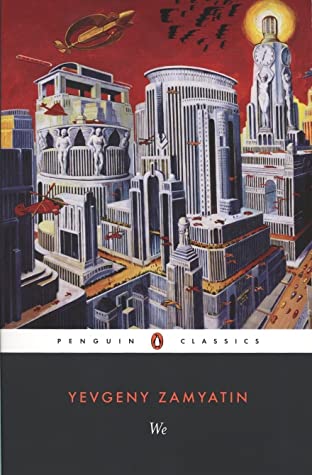- The Good: The grandfather of dystopian science fiction
- The Bad: Meandering plot; racist depiction of Africans
- The Literary: Chapters as journal entries; stark and disjointed prose that fits the protagonists’ state of mind
Mathematician D-503 pours all of his energy into building the spaceship Integral and lives ardently for the OneState, which has perfected humanity and with the Integral plans to subjugate alien species with the beneficent yoke of reason. The totalitarian society is devoid of passion and creativity, citizens live in glass houses inside a walled city for easy supervision, wear identical uniforms and eat synthetic food, and sex is only allowed with specific partners during the designated hour.
The goal of the OneState is universal happiness, and the story of We is a precursor to George Orwell, Aldous Huxley, Ayn Rand, and Margaret Atwood, among many other seminal works in the dystopian genre. Despite being written a century ago, most of the dystopian elements feel fresh, if over worn by the stories that have followed in its wake. The book was deemed too radical for the mother country and is still not published in Russia.
Written as a series of journal entries, D-503’s allegiance to the OneState is shaken when he meets I-330, a tall beautiful woman with sharp teeth who harbors illegal ideas of revolution. He falls for her when she performs music of the ancestors in order to demonstrate inspiration, that obscure form of epilepsy. D-503 is emotionally moved but can only describe it as madness, torment, pain, and passion, before he recovers himself and nervously laughs it off.
Obsessed, D-503 cannot work, eat, or sleep. He shuns his former sex partner O-90 and his best friend R-13. He goes to a doctor, who tells him that he’s very sick, before donning x-ray glasses and studying his brain. “Sorry to say, but it’s serious! Looks like you have developed a soul.” He wanders the city like a zombie, and every small encounter with I-330 only fuels the fire of his passion. She gives him small tasks for the resistance, and he obeys, though a small part of him wants to remain loyal to his government, he is powerless against her.
Compared to Brave New World, I find the plot more rambling, but I like that even the most devoted citizen, D-503, has natural barbarous tendencies that must be minimized and maintained with order and rationality. I love the strong female leads as the catalysts for change, and I’m not surprised the translator’s note mentions that Zamyatin’s wife brought him into the fold of radical politics. I love the ending.
One particular note does not read well to modern eyes. R-13, D-503’s best friend, is an African with dark skin, and when he talks, “words spray out of him, splattering out of those thick lips”. In the midst of D-503’s obsession with I-330, he is outrageously jealous of R-13’s association with her, and when R-13 saves I-330 from a mob, D-503 describes R-13 as “nasty and agile, like a gorilla”. Ugh.
I highly recommend this edition published by Ecco for the introduction by Margaret Atwood and the essay by Ursula K. LeGuin, who considered We the single best work of science fiction when she wrote the review in 1973. Every fan of science fiction dystopia should read this precursor to the greats we all know and love. There is no final revolution!
